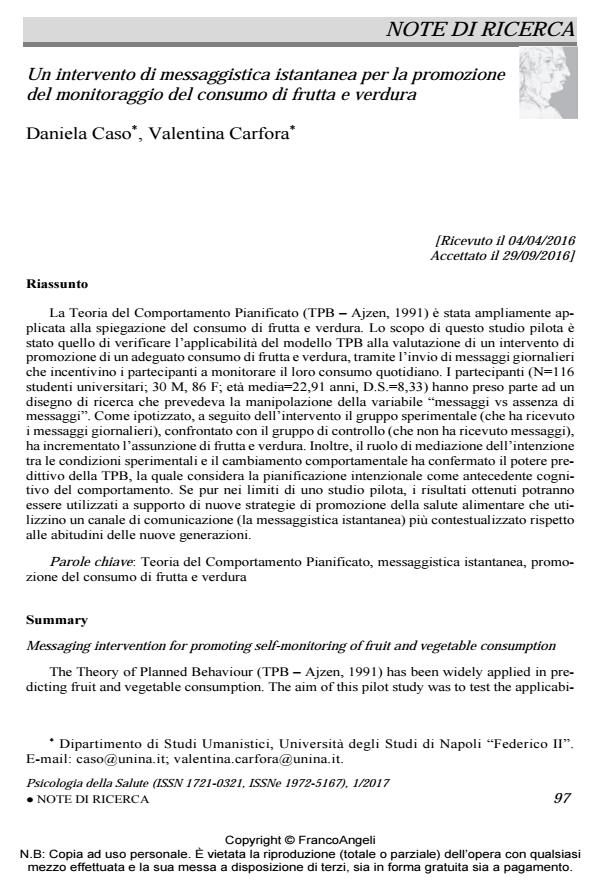Un intervento di messaggistica istantanea per la promozione del monitoraggio del consumo di frutta e verdura
Titolo Rivista PSICOLOGIA DELLA SALUTE
Autori/Curatori Daniela Caso, Valentina Carfora
Anno di pubblicazione 2017 Fascicolo 2017/1
Lingua Italiano Numero pagine 15 P. 97-111 Dimensione file 223 KB
DOI 10.3280/PDS2017-001005
Il DOI è il codice a barre della proprietà intellettuale: per saperne di più
clicca qui
Qui sotto puoi vedere in anteprima la prima pagina di questo articolo.
Se questo articolo ti interessa, lo puoi acquistare (e scaricare in formato pdf) seguendo le facili indicazioni per acquistare il download credit. Acquista Download Credits per scaricare questo Articolo in formato PDF

FrancoAngeli è membro della Publishers International Linking Association, Inc (PILA)associazione indipendente e non profit per facilitare (attraverso i servizi tecnologici implementati da CrossRef.org) l’accesso degli studiosi ai contenuti digitali nelle pubblicazioni professionali e scientifiche
La Teoria del Comportamento Pianificato (TPB ? Ajzen, 1991) è stata ampliamente applicata alla spiegazione del consumo di frutta e verdura. Lo scopo di questo studio pilota è stato quello di verificare l’applicabilità del modello TPB alla valutazione di un intervento di promozione di un adeguato consumo di frutta e verdura, tramite l’invio di messaggi giornalieri che incentivino i partecipanti a monitorare il loro consumo quotidiano. I partecipanti (N=116 studenti universitari; 30 M, 86 F; età media=22,91 anni, D.S.=8,33) hanno preso parte ad un disegno di ricerca che prevedeva la manipolazione della variabile "messaggi vs assenza di messaggi". Come ipotizzato, a seguito dell’intervento il gruppo sperimentale (che ha ricevuto i messaggi giornalieri), confrontato con il gruppo di controllo (che non ha ricevuto messaggi), ha incrementato l’assunzione di frutta e verdura. Inoltre, il ruolo di mediazione dell’intenzione tra le condizioni sperimentali e il cambiamento comportamentale ha confermato il potere predittivo della TPB, la quale considera la pianificazione intenzionale come antecedente cognitivo del comportamento. Se pur nei limiti di uno studio pilota, i risultati ottenuti potranno essere utilizzati a supporto di nuove strategie di promozione della salute alimentare che utilizzino un canale di comunicazione (la messaggistica istantanea) più contestualizzato rispetto alle abitudini delle nuove generazioni.�
Parole chiave:Teoria del Comportamento Pianificato, messaggistica istantanea, promozione del consumo di frutta e verdura
- Regulatory Focus and the Effect of Nutritional Messages on Health and Well‐Being: The Case of Red Meat Intake Mauro Bertolotti, Valentina Carfora, Patrizia Catellani, in Applied Psychology: Health and Well-Being /2020 pp.212
DOI: 10.1111/aphw.12180 - Moderating effects of pro-environmental self-identity on pro-environmental intentions and behaviour: A multi-behaviour study V. Carfora, D. Caso, P. Sparks, M. Conner, in Journal of Environmental Psychology /2017 pp.92
DOI: 10.1016/j.jenvp.2017.07.001 - Informational and emotional daily messages to reduce red and processed meat consumption Valentina Carfora, Mauro Bertolotti, Patrizia Catellani, in Appetite 104331/2019 pp.104331
DOI: 10.1016/j.appet.2019.104331 - Randomised controlled trial of a text messaging intervention for reducing processed meat consumption: The mediating roles of anticipated regret and intention V. Carfora, D. Caso, M. Conner, in Appetite /2017 pp.152
DOI: 10.1016/j.appet.2017.06.025 - The Effect of Persuasive Messages in Promoting Home-Based Physical Activity During COVID-19 Pandemic Valentina Carfora, Patrizia Catellani, in Frontiers in Psychology 644050/2021
DOI: 10.3389/fpsyg.2021.644050 - How to reduce red and processed meat consumption by daily text messages targeting environment or health benefits V. Carfora, P. Catellani, D. Caso, M. Conner, in Journal of Environmental Psychology 101319/2019 pp.101319
DOI: 10.1016/j.jenvp.2019.101319 - The Influence of Message Framing on Consumers’ Selection of Local Food Valentina Carfora, Maria Morandi, Patrizia Catellani, in Foods /2022 pp.1268
DOI: 10.3390/foods11091268 - Dialogue management in conversational agents through psychology of persuasion and machine learning Valentina Carfora, Francesca Di Massimo, Rebecca Rastelli, Patrizia Catellani, Marco Piastra, in Multimedia Tools and Applications /2020 pp.35949
DOI: 10.1007/s11042-020-09178-w - The psychosocial antecedents of the adherence to the Mediterranean diet Valentina Carfora, Maria Morandi, Anđela Jelić, Patrizia Catellani, in Public Health Nutrition /2022 pp.2742
DOI: 10.1017/S1368980022000878 - Using Messages Targeting Psychological versus Physical Health Benefits to Promote Walking Behaviour: A Randomised Controlled Trial Daniela Caso, Valentina Carfora, Miriam Capasso, Deborah Oliano, Mark Conner, in Applied Psychology: Health and Well-Being /2021 pp.152
DOI: 10.1111/aphw.12224 - Il ruolo del rimpianto anticipato nella previsione del consumo di frutta come snack tra i giovani Luigina Canova, Andrea Bobbio, Anna Maria Manganelli, in PSICOLOGIA DELLA SALUTE 1/2022 pp.114
DOI: 10.3280/PDS2022-001007 - A Cognitive-Emotional Model to Explain Message Framing Effects: Reducing Meat Consumption Valentina Carfora, Massimiliano Pastore, Patrizia Catellani, in Frontiers in Psychology 583209/2021
DOI: 10.3389/fpsyg.2021.583209 - Promoting water intake. The persuasiveness of a messaging intervention based on anticipated negative affective reactions and self-monitoring Valentina Carfora, Daniela Caso, Francesco Palumbo, Mark Conner, in Appetite /2018 pp.236
DOI: 10.1016/j.appet.2018.08.017
Daniela Caso, Valentina Carfora, Un intervento di messaggistica istantanea per la promozione del monitoraggio del consumo di frutta e verdura in "PSICOLOGIA DELLA SALUTE" 1/2017, pp 97-111, DOI: 10.3280/PDS2017-001005